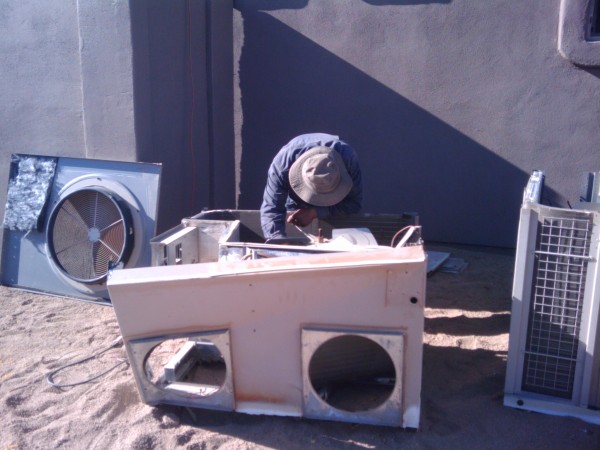Listen to Valeria Fernandez’s story about Irene and Gerardo this week on NPR’s Latino USA.
[audio: valeria_fernandez_latinoUSA_07.23.10.mp3]PHOENIX – In these days of continually breaking news from Arizona it’s hard to stop for a minute — take it all in — and listen. But that was my assignment. Listen.
Seems fitting for a radio piece. Yet, sometimes our expectations of what a story should be tend to get in the way.
Since the passage of SB 1070, a new law that makes it a state crime to be an undocumented immigrant, I find myself pulled in many directions. One day I’m sitting inside a courtroom trying to wrap my mind around legal arguments on the law. The next second, I’m in the street putting my microphone between two people who are yelling at each other.
It’s usually more of a shouting-match than a conversation. When something is so personal I know it can be hard to even want to concede that the other person may have a point. And it gets even worse when language barriers stand in the way.
Arizona is divided on SB 1070. But viewpoints are not black and white. If there is agreement on anything it’s that everyone is frustrated.
That’s what I found when I spent some time interviewing Irene Littleton a resident of the town of Casa Grande, and Gerardo, an undocumented immigrant from Mexico.
There’s another thing that unites people who are divided by their views on the new law. It is fear. Some fear for their security, their retirement, their homes. They want the police to do more to protect them and they feel the protection will come by giving the authorities immigration powers.
Immigrants are so fearful that they are worried if there’s a police station near the park or the church in their neighborhood because if they get stopped, their trip may end up on the other side of the border. Their entire life in the U.S, the life they built for years, is at stake.
I met Irene outside the Arizona State Capitol. We were both very early for a Tea Party event. She was under a gazebo seeking shelter from the heat and wearing a T-shirt with an American flag on it.
I have a heavy Uruguayan accent. When I do interviews about immigration issues in English with supporters of SB 1070, my accent sometimes puts people off. It also inevitably leads to questions about my nationality and whether I entered the country illegally.
I’ve gotten used to it, but at times it has made it difficult to establish trust with people who assume I write only in Spanish and feel they haven’t been portrayed fairly by the Spanish-language press.
Irene didn’t focus on my accent. She was mostly interested in having a conversation. She told me she lived in Casa Grande, Arizona about 60 miles from Phoenix, and that she was afraid for her safety because the town was a known corridor for human smuggling.
She moved from New Hampshire two years ago, fulfilling a dream to live in Arizona, the Grand Canyon state. But things didn’t turn out as she expected. She hasn’t been able to find a new job in IT and her home was broken into last August.
She doesn’t know who did it. She can’t blame undocumented immigrants. But it adds to her concerns as she hears in the news about a deputy being shot by alleged smugglers in her area. On top of that, the federal government is putting signs near her town warning that it’s a dangerous smuggling corridor.
Because of all these things, Irene feels she needs to live her life differently -put in a security system and be watchful, even though media reports say that crime is down in Arizona.
When SB 1070 passed it gave her a new sense of security. And it’s not because she fears immigrants that work on landscaping or thinks that they are all coming here to commit crimes. She believes the new law, scheduled to take effect on July 29, will send a message to the federal government that it needs to secure the U.S. – Mexico border.
There are other things that concern Irene. She is bothered by the fact that at the grocery story she seems to be surrounded by people speaking Spanish who she can’t understand.
Irene is a first-generation Italian who loves her culture and grew up in a home where Italian was spoken. She’s upset that many immigrants come to the U.S. and don’t seem to learn the language.
Gerardo, an undocumented immigrant from Mexico, would beg to differ with Irene on many points. I met him about two years ago, and I know he has been trying for quite a while to come to terms with whether to stay in Arizona. SB 1070 seemed to be the tipping point for him.
I learned he had decided to go to Canada and gave him a call. He was packed and ready to go. Two weeks later, when I called him again, Gerardo had changed his mind.
His children convinced him that it was better for the family to stay together rather than risk moving from Arizona and being caught by immigration authorities.
He speaks fairly good English, but for this story I interviewed him in Spanish because he felt that way he could express himself better –from the heart.
He understands why some people like Irene are afraid of illegal immigration. He believes it’s because of the way the media has portrayed people like him, and the way Arizona Governor Jan Brewer has put out a message saying immigrants smuggle drugs across the border, that there are beheadings in the desert.
Of course, he says, they are afraid. But he feels workers like him, who have been here for over a decade, are being shortchanged and thrown into the mix with criminals.
He wonders why all the focus is on smugglers and drug dealers. What about the reality of people that are working day to day at golf courses, hotels, restaurants, landscaping and constructions sites?
It hurts him to see the looks on people’s faces when he takes his family to a store and they speak Spanish among themselves. One part of him believes this is no place to raise a family. He also believes there’s more to Arizona’s SB 1070 than security concerns. He calls it “racism.”
Gerardo and his family have applied to remain in the U.S. legally. But his greatest frustration is that it may take years for the application to be approved.
The more I spoke with Gerardo and Irene, the more they seemed to be in agreement over one thing: the country needs to change the way it deals with immigration.
They both say that it would be good if people already here could become part of a process in which they are given a document to stay. Irene goes as far as saying, “until they can become a citizen.”
They both agree good people should be allowed to stay in the U.S. even if they entered illegally.
Irene said she didn’t want people to be uprooted and displaced by SB 1070. Gerardo said that’s what will happen, they may have to “run when the witch hunt begins.”
Gerardo and Irene will probably never meet. If they did, it probably would be while standing on different sides of the street, perhaps holding signs in support of or against the new law. If they ever struck up a conversation they would surprise each other over how much they have in common.
But that only can happen if they do one thing. Listen.




